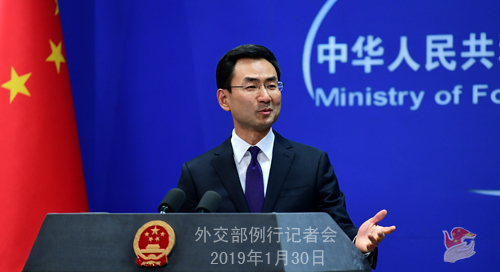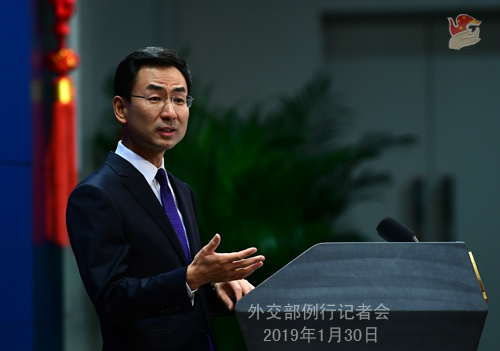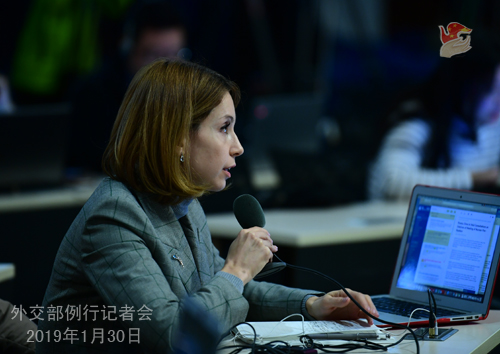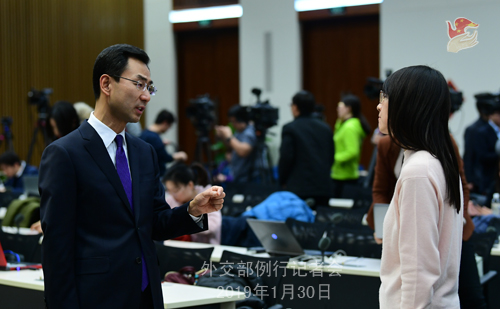| Foreign Ministry Spokesperson Geng Shuang's Regular Press Conference on January 30, 2019 |
| 2019-01-30 22:48 |
|
Q: We were curious why Vice Premier Liu He went to the US early and if you could tell us anything about his schedule on Wednesday? A: Did you say that Vice Premier Liu He went to the US ahead of schedule? Why did you say that? Journalist explains: Some media reported in this way. A: My understanding is that Vice Premier made this trip to the US for trade talks in accordance with the arrangements previously agreed on by the two sides. Q: The Beijing P5 Conference lifted its curtain this morning. Can you give us some information on that? A: The Beijing P5 Conference commenced this morning in Beijing. China, France, Russia, the UK and the US, as the five nuclear-weapon states, all affirmed their important and special responsibilities to uphold international peace, security and stability. Recognizing the severe challenges to international security, the five countries expressed readiness to enhance coordination, manage differences and jointly deal with threats to international security. In light of the current situation, the fact that the five nuclear-weapon states are sitting down for face-to-face and in-depth discussions on urgent strategic security issues in itself sends an important and positive signal to the world. During the meeting, the five nuclear-weapon states will have an in-depth exchange of views on issues related to nuclear policies and strategies, nuclear disarmament and nuclear non-proliferation. As the host, China will release more information on this conference at a proper time. Follow-up: Is this meeting just for today or will it continue tomorrow? A: It will continue tomorrow. Q: Could you provide some comments on the review process for the draft of China's new foreign investment law? A: I also learned about this review process from media reports. So, I would advise you to ask the competent authority for the specifics.
Q: Yesterday, at a hearing organized by the US Senate Select Committee on Intelligence, Director of the US National Intelligence said that he has some concerns about the expanding cooperation between Russia and China. He said that Moscow and Beijing are eroding well-established norms and trying to rebuild the international system. He also said the two countries are increasing the risk of regional conflicts, particularly in the Middle East and East Asia. Do you have any comments? A: China and Russia, two major powers with global influence and permanent members of the UN Security Council, both maintain that efforts should be made to uphold the international order with the purposes and principles of the UN Charter at the center, promote multipolarity in the world, and make the international relations more democratic. China-Russia relations are at their best in history, thanks to the facts that the two countries have left behind the outdated zero-sum game mindset which presupposes that two major powers must be either allies or rivals, regarded each other as development opportunities, and established the Comprehensive Strategic Partnership of Coordination. China and Russia have forged a new type of state-to-state relations featuring non-alliance, non-confrontation, and not targeting any third country, setting an exemplary precedence for the international community and major-country relations. Coordination between China and Russia in international affairs has effectively promoted regional and global peace, security and stability, acting as an anchor of stability in the turbulent and fluid international situation, and showcased the sense of responsibility of the two major powers for world peace and development. Follow-up: He also said that China poses the biggest threat to the US. Do you have any comments? A: If I recall correctly, I replied to a similar question last January or February. At that time, the US Senate Select Committee on Intelligence also held a hearing where a certain US official said that threats to the US came from hither and thither and particularly singled out China and Russia. I am going to repeat my answer then because I believe it is still applicable today. "We have seen relevant reports. The US is the world's number one superpower with unrivaled military strength. If even the US perceives threats from far and near, what about others? They must feel that danger is crouching right at their doorsteps, wouldn't they? How could they possibly carry on with their lives with such a mentality? It baffles me as to where the US gets its strong sense of insecurity. I want to stress that it is impossible to find absolute security in the world. Nor is it possible for any country to achieve its security at the expense of others' insecurity. The Chinese side always advocates a new security concept featuring common, comprehensive, cooperative and sustainable security. We hope that the US will discard the zero-sum game mindset, stop viewing major-country relations from a confrontational perspective, and, heeding the call of the times for peace and development, make concerted efforts with China, Russia and the rest of the international community to uphold world peace and security. This is what I said last year and what I want to say today. If next year, the US Senate Select Committee on Intelligence is to hold another such hearing and release similar remarks, I will still respond in this way.
Q: I have a question regarding the Beijing P5 Conference. The NPT has three goals. The first, which is non-proliferation, tends to be emphasized at the expense of the other two goals of the treaty, which are nuclear disarmament and peaceful uses of nuclear powers. Could you just please say a bit about China's commitments to the other two goals of the NPT? A: I can see that you know the treaty very well. The Treaty on the Non-Proliferation of Nuclear Weapons is the cornerstone of the international nuclear non-proliferation and nuclear disarmament regime, and an essential part of the post-war international security system. Since coming into effect, it has played an important role in preventing nuclear proliferation, advancing nuclear disarmament, and promoting peaceful uses of nuclear energy. As a firm supporter of multilateralism, China is committed to upholding the purposes and goals of the NPT. In light of the current situation, the international community should stick to multilateralism, advance nuclear non-proliferation, nuclear disarmament and peaceful use of nuclear energy - the three goals of the NPT - in a comprehensive and balanced manner, and seek practical measures through extensive consultations. We firmly oppose approaching the efficacy of the NPT with double standards, and believe that countries should consistently uphold and strengthen the authority, universality and effectiveness of the NPT and move forward the NPT review process for practical outcomes so as to better cope with new issues in the fields of arms control and non-proliferation. Q: The representatives of the US and Afghan Taliban recently held talks in Doha, Qatar. What is your response to these talks? A: We have noted relevant reports. The Chinese side always believes that the Afghan issue should be settled through political means and firmly supports the Afghan-led and Afghan-owned peace and reconciliation process. We support parties to the Afghan issue in stepping up dialogues to create conditions for the final solution of the issue. The actions taken by all parties should be conducive to realizing peace and stability in Afghanistan. China will continue to play a positive and constructive role to this end. Q: I wonder if the denuclearization of the Korean Peninsula is going to be a topic at the Beijing P5 Conference? A: The Beijing P5 Conference was opened this morning, and just now I gave you some initial information on it. The five countries will exchange in-depth views on such issues as nuclear policies and strategies, nuclear disarmament and nuclear non-proliferation. When the meeting concludes, the Chinese side, as the host of this meeting, will release more information, including on what you are interested in.
|
 |
|



